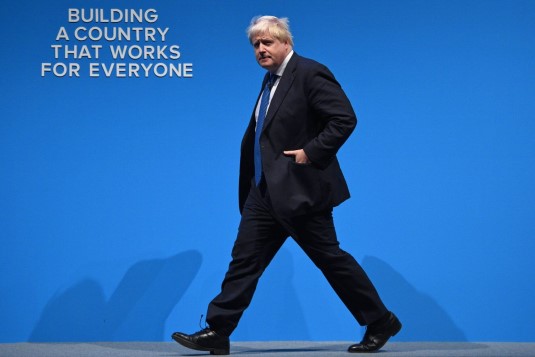
Nevertheless, we can suppose a couple of things. Given May's disastrous handling of Brexit, MPs and members alike will want someone who offers "clarity". In Tory land, that means hard Brexit and/or no deal. So any liberal hopes that Justine Greening, Amber Rudd or, be still your beating FBPE heart, Ken Clarke stand a chance, well, snuff that nonsense out right now. Second, the Tories want someone who can piece together their disintegrating coalition, and thirdly someone who can take the fight to Jeremy Corbyn. In this regard, Esther McVey recently burnished working class creds, Liz Truss has positioned herself as the optimistic Tory who's down with the kids because she's heard you can do funky things with computers like send email, and Jeremy Hunt is going hard on the military promising it all the money. To be honest, thanks to the mugging of Gavin Williamson, I'm surprised someone hadn't run with this ball sooner.
We don't know who's going to win, but we can guess at the contest's politics. Each contender will look at the polls, purse their lips and tot up the Tory percentages, the dismal UKIP percentages, and the numbers the Brexit Party are attracting. This offers the path of least resistance, suggesting hard Brexit/no deal is the vote winner that will see Labour off. Indeed, some senior Tories have publicly floated a coalition/pact with Farage to win an election and get Brexit done and dusted.
As argued previously, the Tories have three possible futures. There is the disintegration and splitting of the Tories, which is what we're seeing right now. The MPs are staying put but Conservative Home has spent the last month reporting on the voting intentions of Tory members, and a lot of them are ticking the Brexit Party box. Donors and activists are defecting and deserting, people the party can ill-afford to lose, and the whole shebang is shaking itself apart. If May's statement about the leadership election is reneged on - and who knows with her? - then it's more dissipation, more decomposition.
Alternatively, the Tories could have a thorough clean. Steaming through and getting rid of the horrible old reactionaries and Thatcherites, and relaunching themselves as a moderate, socially liberal centre right party is the direction they need to move in if conservative politics is to be viable over the long-term, but the chances of that happening without assistance from existing centrist outfits is most, most unlikely.
The final option, the one I thought would be their most likely strategy, is to try and build a right-populist coalition by being as Brexity as possible. A recipe for instasuccess, surely? Well, no. One cannot simply walk into Mordor, and one shouldn't automatically count Brexit Party votes into your pile. A lot of them, certainly, but not all. You'd have thought the collapse of UKIP's support in 2017 would have driven this lesson home. Second, May built her general election coalition off the back of the Tories being the party who would deliver Brexit. It was the ideological glue that held the show together. Then, in the swivelled eyes of the leave ultras, she betrayed Brexit with her delays and more delays. Would they trust a Tory again to deliver, even if the new leader is ERG-aligned and/or a (comparative) fresh face? Some would go along with it, but some wouldn't. Third, there are the effects of polarisation. Going all-out on hard Brexit runs the risk of firming up Labour's vote as per 2017, but this time with an added complication. Part of May's original appeal and success was her rhetorical difference from her predecessor. The one nation Tory stuff turned out to be nothing more than flowery words, but it did turn heads at the time. While definitely not a liberal Tory, even a superficial one like Dave, her emollient words about healing the nation and poverty was enough to keep centre-leaning, remain-ish Tory voters on board. A populist strategy dumps all that. They're not going to go Labour any time soon, but enough of them could go LibDem - as per the local elections - to give them serious headaches. And lastly, they could offer Farage something but he's not guaranteed to bite. He is the perfect figure for Brexit grumbles because he is outside the system. He knows full well that once he enters it in some form of governing or deal-making capacity, the lustre wears off. He also knows hanging around with "insiders" reduces his stock too, especially Tory insiders. It all depends what he wants - a nice seat or a berth in the Lords, or continuing his career as an outsider politician with no responsibility beyond meeting his media schedule. Abandoning the latter leaves the road open to someone else, however.
Regardless of Farage's intentions, a Tory populist strategy would only go so far in reassembling its vote. They might think it would be enough for a thumping majority, but as things presently stand its a plan for a voter bloc less substantial than the one put together by May. However, given the alternatives - split and extinction vs detoxification, splits, and partial disintegration, it is my happy responsibility to report they have no easy way out, let alone a convincing strategy for winning a general election.
There's not enough mileage in the swivel eyed loon vote to last the long-term. A big chunk of the Breixt vote doesn't normally vote at all, they won't stick with an increasingly hard right Tory part, especially after it plugs the huge hole in the trade strategy by becoming a US rule taker.
ReplyDeleteFarage by his own admission was planning a new life in the US funded by his political lobbyist mate. Funny how his populist base haven't twigged this isn't exactly consistent with leading the people to freedom!